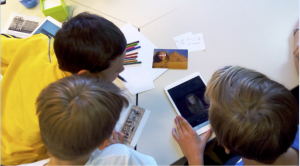Critical use of media: 5C’s cooperation with the Freie Universität Berlin
by Sandra Pyne (Teacher of Nelson-Mandela-Schule, Berlin), 21.6.17
We live in a post-truth world where alternative facts and fake news have become the norm. So how can our students use media critically to become effective researchers who can have confidence in the information they find? Those issues were the background to the first of two workshops at the Freie Universität. Under the guidance of Prof. Dr. Petra Anders (FB Erziehungswissenschaft und Psychologie: Grundschulpädagogik/Deutsch/DaZ) and her team of trainee teachers, children in 5C were set to develop their skills of Medienkritikfähigkeit, or critical use of media. The workshops were based on 5C’s current research topic for a presentation in history: the afterlife in ancient Egypt.
The two-hour workshop was divided into three stations: (1) finding and evaluating information on ideas about death in ancient Egypt (2) how to handle pictures found online (3) recognizing fake news.This workshop coincides with the implementation of the Basiscurriculum Medienbildung. As it is quite challenging for schools to teach the competencies of ‚analysis‘ and ‚reflection‘, this cooperation with an external partner like the FU is a wonderful opportunity for students at the Nelson Mandela School.
So what did the children report on what they had learnt?
“Awesome workshop! If you know how to photoshop, it’s easie r to spot pictures that have been photoshopped.” (Manuel)
r to spot pictures that have been photoshopped.” (Manuel)
“How you know if websites are real or fake – look at the author and contact details, and the date to see if you are looking at old or new information. There should be no advertising, or at least meaningful advertising.” (Tara)
“Check the author – it’s good if you can find a professor or something. It’s good if you can compare with something that you trust, or information from more than one website.” (Ruby)
“It’s good if you can compare one video or website with another website or another video about the same topic, or books.” (Lydia)
“If you find a picture and you want it for a presentation, you can’t take it and pretend it’s yours, you have to write who you took it from.” (Nora)
“You can trust a video that you watch if a professor, scientist or archaeologist is talking.” (Ben)
“If you go website and you see a commercial for really dumb things like games, you shouldn’t really trust it. Don’t trust a website with lots of mistakes.” (Emma)
“If you the information you read on a website doesn’t make sense, don’t trust it.” (Niamh)
“It’s helpful if you know something about the topic before you research, so you have a better idea of what makes sense.” (Yaje)
“You always need to be able to contact someone so you can check that a real person has written something. Copyright is important.” (Lia)
From these comments, the workshop at the FU has clearly helped children in 5C to develop their skills in critically assessing what they read and watch, especially online. They are using these skills to build up a personal list of trusted media sources to rely on for their own research. They also know they have to be academically honest researchers. Watch this space for a report on our second workshop!

